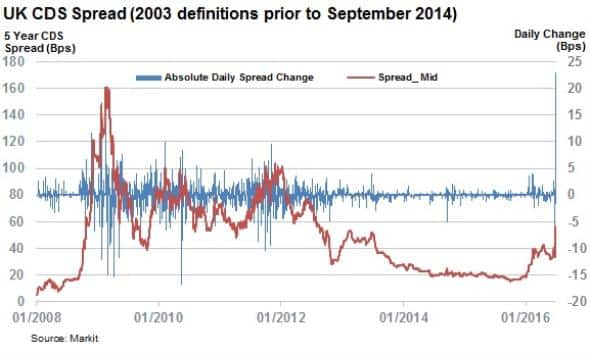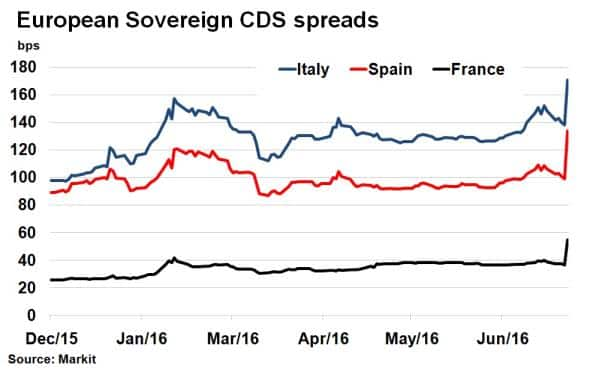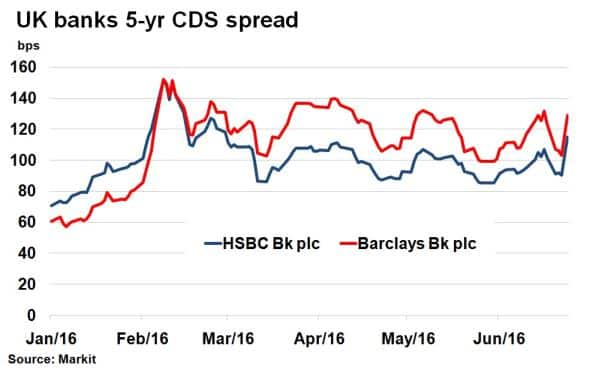Customer Logins
Obtain the data you need to make the most informed decisions by accessing our extensive portfolio of information, analytics, and expertise. Sign in to the product or service center of your choice.
Customer Logins
CREDIT COMMENTARY
Jun 24, 2016
Credit markets in freefall after shock Brexit result
Investors dump risk after UK vote's 52%-48% in favour of leaving the EU
- UK 5-yr sovereign CDS spread has widened by 69%, to 56bps
- Contagion fears has seen peripheral European sovereign credit spreads widen to 2011 levels
- HSBC and Barclays saw credit spreads widen, but shy of February's highs
A shock result in yesterday's UK referendum has seen wild reaction in the credit market following Thursday's unexpected win for the "leave" camp. The market had clung to the hope that "stay" would prevail and today's wild swings in the pound and UK equities indicate both the unexpected nature and the level of uncertainty.
The heightened level of volatility saw investors clamber to safe haven assets, with 10-yr UK gilt yields falling to 1.02%, a new record low according to Markit's bond pricing service. 
This only tells half the story however, as the UK's credit risk surged the most on record this morning according to Markit's CDS pricing service. UK 5-yr sovereign CDS spreads widened to 56bps on an intraday basis, up from 33bps last night.
Periphery spreads surge on contagion fear

Fears of contagion leading to further future fractures in the EU meant credit risk rose in a number of European sovereigns. France saw its 5-yr CDS spread widen 49%. Peripheral Europe, Italy and Spain seeing their 5-yr CDS spread widen 24% and 25%, respectively, overnight. Levels are at their widest since the European sovereign debt crisis in 2011.
Banks take hit

The cost to protect against UK banks also rose, with CDS spreads in HSBC and Barclays seeing sharp widening this morning. However, spreads are still lower than the highs seen in February, when Europe's banking sector saw intensified asset volatility.
Neil Mehta | Analyst, Fixed Income, Markit
Tel: +44 207 260 2298
Neil.Mehta@markit.com
S&P Global provides industry-leading data, software and technology platforms and managed services to tackle some of the most difficult challenges in financial markets. We help our customers better understand complicated markets, reduce risk, operate more efficiently and comply with financial regulation.
This article was published by S&P Global Market Intelligence and not by S&P Global Ratings, which is a separately managed division of S&P Global.
{"items" : [
{"name":"share","enabled":true,"desc":"<strong>Share</strong>","mobdesc":"Share","options":[ {"name":"facebook","url":"https://www.facebook.com/sharer.php?u=http%3a%2f%2fwww.spglobal.com%2fmarketintelligence%2fen%2fmi%2fresearch-analysis%2f24062016-credit-credit-markets-in-freefall-after-shock-brexit-result.html","enabled":true},{"name":"twitter","url":"https://twitter.com/intent/tweet?url=http%3a%2f%2fwww.spglobal.com%2fmarketintelligence%2fen%2fmi%2fresearch-analysis%2f24062016-credit-credit-markets-in-freefall-after-shock-brexit-result.html&text=Credit+markets+in+freefall+after+shock+Brexit+result","enabled":true},{"name":"linkedin","url":"https://www.linkedin.com/sharing/share-offsite/?url=http%3a%2f%2fwww.spglobal.com%2fmarketintelligence%2fen%2fmi%2fresearch-analysis%2f24062016-credit-credit-markets-in-freefall-after-shock-brexit-result.html","enabled":true},{"name":"email","url":"?subject=Credit markets in freefall after shock Brexit result&body=http%3a%2f%2fwww.spglobal.com%2fmarketintelligence%2fen%2fmi%2fresearch-analysis%2f24062016-credit-credit-markets-in-freefall-after-shock-brexit-result.html","enabled":true},{"name":"whatsapp","url":"https://api.whatsapp.com/send?text=Credit+markets+in+freefall+after+shock+Brexit+result http%3a%2f%2fwww.spglobal.com%2fmarketintelligence%2fen%2fmi%2fresearch-analysis%2f24062016-credit-credit-markets-in-freefall-after-shock-brexit-result.html","enabled":true}]}, {"name":"rtt","enabled":true,"mobdesc":"Top"}
]}



